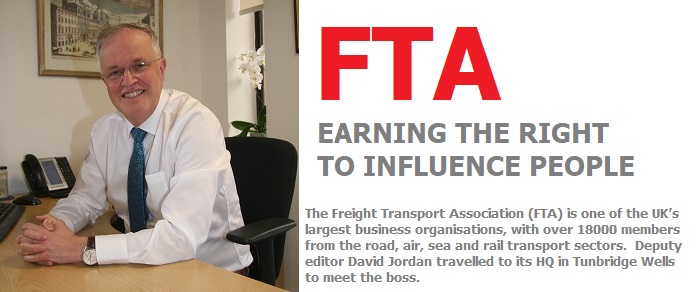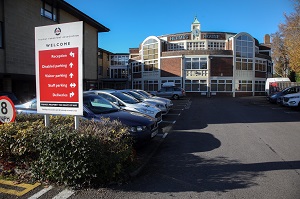The Freight Transport Association (FTA) is one of the UK’s largest business organisations, with over 18000 members from the road, air, sea and rail transport sectors. Deputy editor David Jordan travelled to its HQ in Tunbridge Wells to meet the boss.

Tunbridge Wells, or Royal Tunbridge Wells as it is more properly called, has a coat of arms depicting its heritage as a spa town where in days gone by people came in their thousands to ‘take the waters’. The heraldic shield is carved into a wall outside the town’s main railway station, the motto reads Do well. Fear not, a fitting welcome to this affluent town in south-east England.
I took a taxi up the long hill to FTA’s head office, Hermes House, passing by elegant Victorian houses set back from the road and equally prosperous-looking high street shops. It seems the town’s positive motto of ambition and courage still holds good in these uncertain times.
 After badging-up in reception, Eleanor Matthews from FTA’s PR department introduced me to FTA’s Chief Executive, David Wells. I’d met David before, but only during FTA events and this was the first time I’d had the chance to talk to him one-to-one.
After badging-up in reception, Eleanor Matthews from FTA’s PR department introduced me to FTA’s Chief Executive, David Wells. I’d met David before, but only during FTA events and this was the first time I’d had the chance to talk to him one-to-one.
David studied engineering at Liverpool university but after gaining his degree decided to change direction and joined British Aerospace as a trainee management accountant. After qualifying he had his first taste of the logistics industry working for a Swedish medical company where he was instrumental in setting up a warehouse and distribution network, which at the time became the largest home delivery network in the UK. Later David moved on to other senior management roles working for organisations including engineering giant ABB where he specialised in the acquisition of companies for the Group, a skill which he later put to good use in acquiring two training companies for FTA.
David joined FTA in 2009 as finance director and became chief executive in May 2015. “During those five years my job had got bigger and bigger and I’d had responsibility for most of the departments at FTA, so when my predecessor Theo de Pencier retired, I applied for the job,” said David. “There was a full recruitment procedure both internal and external. I even had to do FTA’s ‘numerical reasoning test’ even though I was the financial director; thankfully I passed and was given the job.”
FTA came into being in its present form in 1969 although its roots go back to 1889 when the Mansion House Association was formed in response to the 1888 Railway and Canal Traffic Act, which allowed traders the right to complain to the Board of Trade if they were unhappy with the rates and services provided by transport companies.
Today FTA policy is made by members from six national councils; the British Shippers Council, the Rail Freight Council, the Air Freight Council, the Road Freight Council, the Water Freight Council and the Strategic Council. There are also 13 regional freight councils.
“We want to be recognised as the voice of the logistics industry across all sectors,” said David. “Our strength is that we have experts in all aspects of logistics and transport issues, from roads, to customs, to compliance, clean air zones and of course more recently issues related to Brexit. We operate regionally, not just from our HQ here in Tunbridge Wells, so we can help with local issues as well as the ones that affect the whole country.”
FTA has offices in the UK, Midlands, Scotland, Brussels and Dublin, but many of FTA’s 400 staff are field-based enabling the Association to provide national coverage.
Clean air zones
One major problem for the moving industry is the roll out of clean air zones across the UK and I asked David if he thought there was a case for giving special dispensation to removals trucks given their relatively lower mileages and longer service life.
“I would say go for it,” said David. “We’ve found that local authorities are prepared to listen if they are presented with a strong case, especially if it is likely to affect how people vote. Point out how much the cost of moving house would increase if the charge was imposed, or if a perfectly serviceable low-mileage vehicle had to be replaced simply to comply with the Euro 6 standard.”
“We’ve had success in persuading councils to reduce the size of their proposed CAZ’s by getting them to look more closely at where the air quality is particularly bad rather than imposing a blanket restriction, so it’s definitely worth putting your case forward.”
Driver shortages
FTA estimates a shortfall of about 52,000 HGV drivers in the UK, so I asked David what can be done to address the problem?
“The driver shortage did fall for a while to around 30,000 a few years ago mainly due to European drivers coming to work in the UK, but that has now risen again to over 50,000,” said David. “The reason isn’t that European drivers are going home so much as the industry’s difficulty in recruiting young drivers. The image of the HGV driver is not good in the UK and we need to make it more attractive, especially if we are going to recruit more women. Improving driver facilities, especially parking and service areas, is something we are working hard to achieve. We have had assurances from government as a result of our efforts, but unfortunately Brexit has taken priority and things have been put on the back-burner.”
Autonomous vehicles
I asked David if he thought autonomous trucks would soon be operating on Britain’s roads?
“Quite honestly no, not in the foreseeable future,” said David. “Although the government may want it, I just can’t see the infrastructure being put in place to support driverless vehicles on our current road system. It may be possible on the motorways or dedicated roads for autonomous vehicles, but not otherwise. I realise that programming is improving all the time, but I think it will be a very long time before fully autonomous trucks are a practical reality on the UK’s roads.”
Electric vehicles
Reducing carbon emissions is a hot topic, but are electric truck and vans a practical solution?
“I can see that electric cars and vans are improving and they can be a practical alternative to conventional vehicles in urban areas,” said David. “The problem is there isn’t the infrastructure in terms of charging facilities to support them. Many people live in areas where there just isn’t any way of connecting them to the electricity supply, people in flats for example or those who park on the street. Some of our members have fleets of electric delivery vans but there is an issue when it comes to providing an adequate electricity supply to their premises and there is no clear guidance as to who is responsible for installing one.”
“All these problems will eventually be solved of course, but they will take time and investment to overcome. Electric trucks I think are the future, but unless there is a dramatic change in battery technology there will have to be changes to weight limits to allow payloads to be maintained, as is the case currently with electric vans.”
My time was up, and it was time to head for home, so I asked David to sum up what FTA is all about.
“Our strategy is very straightforward,” said David. “We present evidence-based arguments about issues affecting our members along with pragmatic solutions. We’re not here to embarrass the government but we will argue and challenge them and champion our industry. We’re not here to create sensational stories or play political games. I believe you have to earn the right to influence people and I think we have achieved that.”
Photos: FTA Chief Executive, David Wells; Hermes House